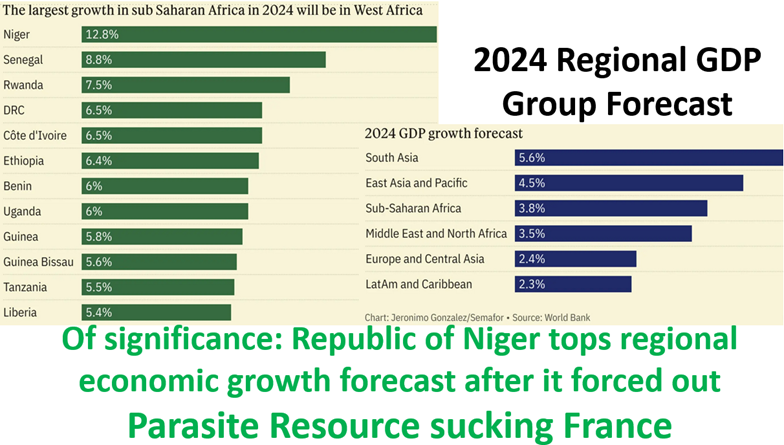Six African countries are among the world’s highest growth economies in 2024
Post By Diaspoint | January 12, 2024

Niger, Senegal, and Rwanda will be among the world’s highest growth economies in 2024, the World Bank said in its report on global economic prospects released this week.
Niger is forecast to grow at 12.5% this year driven by its oil sector which has made up for low uranium production.Its growth rate will only be surpassed by Guyana’s 38.2%, the South American country is also benefiting from an expanding oil sector. Three other African countries expected to be in the top 10 of highest growth economies are the Democratic Republic of Congo, Cote d’Ivoire and Ethiopia.
It reflects an expectation that while growth in Africa’s largest economies — Nigeria, South Africa and Angola — will drag on the rest of the region, economies that are not rich in resources will grow above the expected regional average of 3.8%. Indeed, sub Saharan Africa is expected to grow at 5% this year when Nigeria, South Africa and Angola are excluded from the analysis.
These three will experience modest improvements on the meager growth recorded last year. They posted a combined 1.8% growth in 2023, a decline from the previous year which the World Bank attributes to disruptive monetary policy moves like Nigeria’s currency redesign, revenue shortfalls from low oil production as in Angola, and infrastructure problems notable in South Africa’s energy and transportation sectors.
Growth in sub-Saharan Africa slowed to 2.9% in 2023 from 3.7% and 4.4% in the two years before. The continent’s three largest economies greatly influenced the decline, but performance in other countries slowed to 3.9% due to conflict, weak external demand, and various domestic policy measures to tame rising inflation, the World Bank said.
Two African economies will experience negative growth this year: Equatorial Guinea (-6.1%), and Sudan (0.6%). Overall, the region is still in the throes of a cost-of-living challenge that has “worsened the economic hardship of the poor and increased food insecurity across the region,” the report said.
Read More from original source
